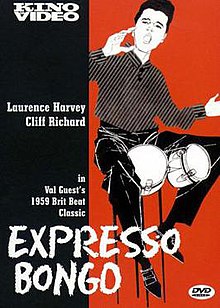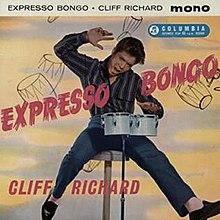Expresso Bongo
| Expresso Bongo | |
|---|---|
 |
|
| Music | Monty Norman, David Heneker |
| Lyrics | Monty Norman, Julian More |
| Book | Julian More, Wolf Mankowitz |
| Premiere | 1958: Saville Theatre |
| Expresso Bongo | |
|---|---|
 |
|
| Directed by | Val Guest |
| Produced by | Jon Penington |
| Written by |
Wolf Mankowitz Julian More (play) |
| Starring |
Laurence Harvey Cliff Richard Sylvia Sims Yolande Donlan Eric Pohlmann Hermione Baddeley Gilbert Harding |
| Music by | Robert Farnon |
| Cinematography | John Wilcox |
| Edited by | Bill Lenny |
| Distributed by | British Lion Films |
|
Release date
|
1959 |
|
Running time
|
111 min. |
| Country | United Kingdom |
| Language | English |
| Expresso Bongo | ||||
|---|---|---|---|---|
 |
||||
| EP by Cliff Richard | ||||
| Released | January 1960 | |||
| Recorded | Sep-Dec 1959, EMI Studios, London | |||
| Genre | Rock and roll | |||
| Label | Columbia | |||
| Producer | Norrie Paramor | |||
| Cliff Richard chronology | ||||
|
||||
Expresso Bongo, a 1958 West End musical and a 1959 film, is a satire of the music industry. It was first produced on the stage at the Saville Theatre, London, on 23 April 1958. Its book was written by Wolf Mankowitz and Julian More, with music by David Heneker and Monty Norman, also the co-lyricist with Julian More. The production starred Paul Scofield with Hy Hazell, Millicent Martin and James Kenney. Musical director was Burt Rhodes and director William Chappell. The subsequent 1959 film version was directed by Val Guest and starred Laurence Harvey, Cliff Richard, and Yolande Donlan.
Paul Scofield played Johnny, a slimy, small-time music promoter and talent scout who notices teenage girls going crazy for the singing and bongo playing of talentless and seemingly idiotic Herbert Rudge (played by James Kenney). Johnny rechristens Rudge as "Bongo Herbert" and signs him to a contract that gives Johnny a 50% share of the profits. With Johnny's help, Bongo rockets to stardom. Bongo's success attracts a host of sleazy music industry types intent on exploiting him. Johnny quickly finds himself outclassed in the sleaze department as Bongo turns out to be the slipperiest slime of them all.
The writers of the 1958 musical were inspired by songwriters such as Noël Coward. (David Heneker said his musical career was inspired by reading the score of Noel Coward's Bitter Sweet). Their lyrics were clever, wordy and allusive: "The Gravy Train", for example, has Johnny quoting an apt line from Shakespeare's Troilus and Cressida, (Act 5, Scene X), while the unrepentant shopaholics in "We Bought It" describe themselves as "two eccentric socialites, dissipated sybarites". The tunes modulate all over the place and parody rock, Latin jazz, skiffle and trad.
Music historian John Snelsen writes,
Expresso Bongo opened in the West End in the same year as My Fair Lady. It did not run as long and has hardly been seen since, but its gritty cynicism, contemporary setting and pop score gained it many fans. It was voted Best British Musical of the Year in a Variety annual survey of shows on the London stage, with a ballot result far ahead of My Fair Lady, and was referred to in general as 'the other musical' to distinguish it from Lerner and Loewe's work.
...
Wikipedia
